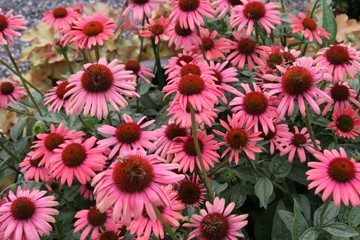I was clearing out the front garden last week, pulling oak leaves from where they had caught in the stems of ‘Carefree Celebration’ Roses and Russian sage. I piled the brown leaves in the garden cart and once it was full, pulled them to the side yard where they could be dumped. As the leaves started to spill from the tipped cart, I looked down and noticed that there were dozens of columbine seedlings growing at my feet.
Clearly, I must have thrown some excess Aquilegia seeds into this part of the garden last year. When I’m planting seeds in the early spring and have too many for the pots and packs that I’ve filled with starting mix, I’ll often toss those odds and ends into the landscape. In addition to leftovers, I’ve found forgotten seed packages whose contents are a year or two old. Knowing that some of these seeds might be viable, I’ll spread them in the garden as well.
I don’t prepare or loosen the soil for these excess seeds. I simply toss them into the landscape where they must fend for themselves. They’ll either grow, or they won’t, right? Better to have them out of the envelope and onto the soil, I think, and better to be hopeful and assume that those seeds will germinate.
In other areas of my life I might take a similar approach. A query letter or media pitch is sent out without expectation of a positive response. A lunch or dinner invitation is given, because perhaps such a meeting will grow into a real friendship. “Let’s get a group together and try this,” I might propose, because you never know when something special will germinate.
Those columbine seedlings remind me, however, that in order to take full advantage of this optimistic broadcast, I need to pay attention. It’s usually not enough to spread seeds and move on, oblivious to whether they sprout or die. New seedlings benefit from regular water when it doesn’t rain, a top dressing of compost, and the removal of weedy competitors.
Follow up is important, in and out of the garden. Perhaps a second letter should be written, a second and third lunch date made, and continued focus placed on group goals. Some things grow against all odds, but others need tending. No matter how the seeds were initially planted, we may need to nurture what we want to grow.

Sometimes things grow with little care or attention, thriving against all odds, but more frequently, a bit of care will make what I've planted flourish.

